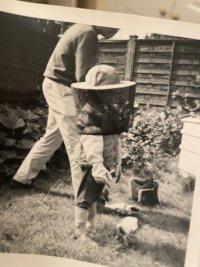Just got back from the second session of a local beginners beekeeping course. It's been extremely interesting so far. The first day was very theoretical, learning about how the hive functions, anatomy and the basics of looking after the hive. Today was very practical, helping out with the inspection of a hive.
Just wondering how many on here keep bees and what the motivation is behind it? Do you sell honey/wax and run it as a business, is it purely for self sufficiency or are you just interested in bees? Etc.
Also interested to hear about any applications for propolis, it's something I'd not heard of previous to starting the course. Seems like it should have some uses for the bushcraft community.
Just wondering how many on here keep bees and what the motivation is behind it? Do you sell honey/wax and run it as a business, is it purely for self sufficiency or are you just interested in bees? Etc.
Also interested to hear about any applications for propolis, it's something I'd not heard of previous to starting the course. Seems like it should have some uses for the bushcraft community.
Last edited:


 . Orpingtons are as terrifying as a large warm plushie!
. Orpingtons are as terrifying as a large warm plushie!